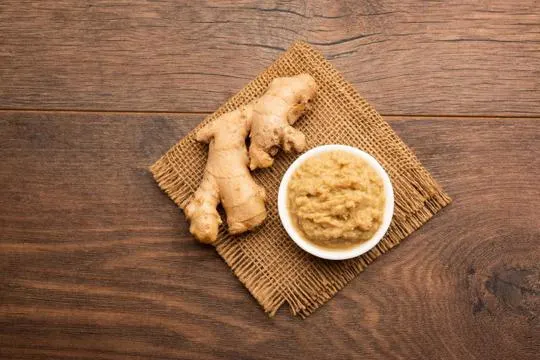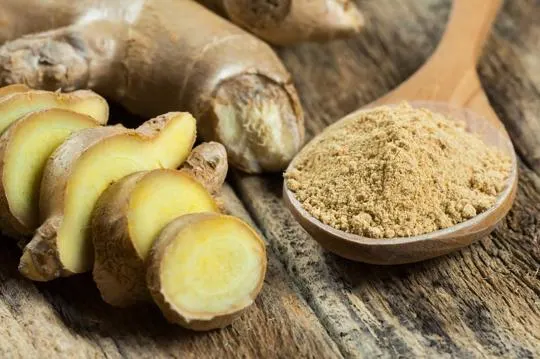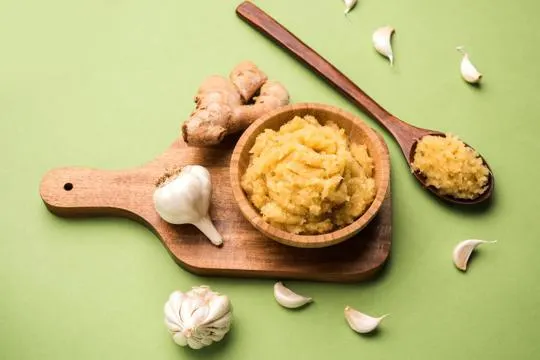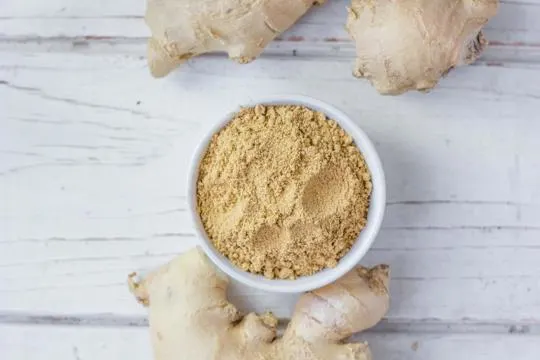Summary of key points
The main difference between ginger paste and ground ginger lies in their texture and preparation. Ginger paste is a smooth mixture made from grated ginger root, while ground ginger is a powder made from dried and ground ginger.
In terms of flavor, both offer the characteristic spicy and slightly sweet taste of ginger, but ginger paste tends to have a stronger and fresher flavor due to its less processed form.
Another factor to consider is their use. Ginger paste is commonly used in Asian cuisines for marinades, sauces, and curries, while ground ginger is more versatile and can be used in both sweet and savory dishes such as baking or seasoning meat.
Whether you prefer the convenience of ready-made paste or the versatility of powdered ginger, both options provide a delicious and unique flavor to your dishes. Plus, they both offer potential health benefits such as anti-inflammatory and digestive properties.
Ginger, that zesty root we all love and hate, has a split personality.
Ginger Paste and Ground Ginger – they’re not twins, trust me. One’s wet, one’s dry. Sounds simple, right?
We’ve all been there, mid-recipe, realizing we picked the wrong ginger sibling.
Each form brings its own flavor punch. Our kitchens have seen it all – triumphs and, well, not-so-great moments.
Why should we care? Because flavor matters. It’s the difference between an “okay” dish and a “wow, what’s your secret?” meal.
What is Ginger Paste?

Ginger paste is key for great-tasting dishes.
It’s made by grinding fresh ginger root into a thick paste.
This gives an intense burst of spiciness and earthiness.
It’s a popular ingredient in many cuisines.
The texture of ginger paste blends easily into sauces, marinades, soups, and stir-fries.
No fibrous residue is left behind.
Unlike ground ginger, it distributes evenly in the dish.
Ginger paste is potent.
Grinding intensifies the spicy and tangy notes.
A small spoonful provides plenty of flavor.
It has a longer shelf life than fresh ginger but shorter than ground ginger powder.
Ginger paste also offers convenience.
No need to peel, chop, and grate fresh ginger root.
Just scoop out the desired amount when you need it.
In conclusion, ginger paste is a great alternative to ground ginger.
It’s smooth, intense, and easy to use.
Next time you want that gingery kick, reach for some handy ginger paste.
What is Ground Ginger?

Ground ginger is a popular spice.
It is made from the rhizome of the ginger plant.
It adds depth and flavor to many dishes – both sweet and savory.
It has a distinct aroma and a warm, earthy taste.
It is convenient and easy to use.
No need for grating or chopping – just blend it in.
It works well in sauces, marinades, baked goods, and beverages.
Ground ginger also holds medicinal properties.
It can alleviate digestive issues and reduce inflammation.
Gingerol, the active compound, has antioxidant and anti-inflammatory effects.
When using ground ginger, remember it is slightly less potent than fresh ginger.
Start with a small amount and add more if desired.
Differences Between Ginger Paste and Ground Ginger

Ginger paste and ground ginger have essential differences.
Ingredients and Preparation
Ingredients and prep are key for making delicious dishes.
They form the basis of any recipe, influencing the tastes and textures.
Each ingredient has its own properties, offering depth and complexity.
Prep is also important, as it impacts the final product.
Here, we discuss ginger paste and ground ginger, noting their differences and how they can enhance meals.
Ginger paste and ground ginger look similar, but vary in form and texture.
Paste is made by crushing fresh ginger into a smooth blend, providing a concentrated flavor.
Ground ginger is dehydrated and pulverized into a fine powder, maintaining its gingery aroma.
Choosing between paste and ground ginger depends on the flavor and ease of use.
Paste is great for intense dishes like curries or marinades due to its strong taste.
Its smooth texture blends easily into sauces and dressings.
On the other hand, ground ginger carries a more subtle flavor, ideal for lightly flavored dishes like baked goods or desserts.
The powdered form is great for sprinkling and dry rubs.
Ginger paste has a shorter shelf life than ground ginger due to moisture content.
So if you plan to store them, ground ginger is best.
Texture and Consistency
Ginger paste and ground ginger look similar, but there are big differences.
Paste is creamy, like thick sauce.
Ground ginger is powdery, like cinnamon or turmeric.
Cooking with them affects dishes differently.
Paste is great for sauces and marinades, and blends easily into liquids.
Ground ginger works for dry rubs and spice mixes.
It sticks to food and has a stronger flavor.
Also, shelf life is different.
Paste spoils faster as it’s moist.
Ground ginger lasts longer as it’s dried during grinding.
It all depends on taste and recipe.
So, try both and find which one tastes best.
Flavor and Aroma
Ginger paste and ground ginger appear alike, but they differ in flavor and aroma.
Ginger paste has a more powerful flavor, adding a ‘kick’ to dishes.
Ground ginger, however, is more mild and sweet.
Aroma-wise, ginger paste has a strong, spicy scent, while ground ginger has a gentle, earthy smell.
Both can be used for different culinary tasks, but it is important to choose the right one, as it affects the taste and smell of the dish.
Usage and Culinary Applications
Ginger paste and ground ginger look similar – but they are for different dishes.
Ginger paste is a smooth, concentrated form and is great for marinades, curries and sauces.
Ground ginger is a dried, powdered version and adds a warm flavor to baked goods like cookies and cakes.
Ginger paste is convenient – it doesn’t need peeling, grating or blending.
It blends easily and has a uniform flavor.
Ground ginger is perfect for adding warmth to baked goodies.
Its powder form is easy to mix into dry ingredients like flour and sugar.
It has a rich aroma and a spicy kick.
In terms of cooking, ginger paste is best for Asian-style recipes, where its intense flavor stands out.
Ground ginger is great for baking, and works with spices like cinnamon and cloves.
It adds depth to cakes, breads, and drinks like tea and hot chocolate.
Ginger paste and ground ginger are both useful in the kitchen.
Knowing their differences can help you use them both for the best flavor.
So, next time you cook or bake, you know which one to reach for.
Similarities Between Ginger Paste and Ground Ginger

Ginger paste and ground ginger have lots in common, making them both popular for adding flavor to dishes.
They both come from the same source – ginger root – and provide a strong, sweet taste.
You can use either one in recipes, giving them an extra pungent kick.
They are an easy alternative to fresh ginger, with a longer shelf life and still the same great flavor.
One key similarity between ginger paste and ground ginger is their ability to add depth to food.
Whether in marinades, sauces, or baking, they both give a rich flavor that makes dishes taste even better.
Especially with international cuisines like Indian or Thai, ginger is a must-have.
Plus, ginger paste and ground ginger are both super convenient.
You don’t need to bother with peeling, grating, or chopping fresh ginger.
Perfect for busy cooks who want the great taste of ginger without the hassle.
However, there are slight differences between them.
Ginger paste has a more watery consistency and sometimes has added vinegar or oil.
Ground ginger is drier, finer, and has a more intense flavor.
How to Use Ginger Paste and Ground Ginger in Cooking?
Ginger paste and ground ginger have different methods and quantities for cooking.
Here’s a guide to help use them effectively.
For ginger paste:
- Work out how much is needed for the recipe.
- Add it directly, making sure it’s evenly spread.
- Mind the strong flavor, so it doesn’t overpower other ingredients.
- Stir it in and let it blend with the flavors while cooking.
For ground ginger:
- Measure the amount of ginger needed for the recipe.
- Put it in during the initial stages, infusing its essence throughout the dish.
- Note that ground ginger is less potent than paste, so use more.
- Mix it well with other spices or ingredients for an even flavor.
Unique details:
Ginger paste and ground ginger have different characteristics.
Paste is stronger, while ginger is milder.
Combine both according to preference and the recipe.
By following these tips, you can use ginger paste and ground ginger in your cooking.
Enjoy adding delightful flavors to dishes.
Storage and Shelf Life of Ginger Paste and Ground Ginger
Ginger paste & ground ginger must be stored properly for their quality & flavor to last.
Ginger paste, made by blending grated ginger with oil, should be kept in an airtight container in a fridge.
Use a clean spoon each time to avoid contamination.
Ground ginger from dried ginger roots should be stored in an airtight container at room temperature.
It’ll last a year if kept away from sunlight & moisture.
Extend shelf life by freezing them.
For ginger paste, put it in ice cube trays or on parchment paper.
For ground ginger, store it in freezer-safe bags or containers & make sure they are sealed.
Conclusion
Thus, with all the different varieties and uses of ginger paste versus ground ginger, it’s understandable why many people are confused over which is best for their recipes.
However, when in doubt, both are good options when used at the right time and in the correct amounts.
With ginger paste, you can enjoy a stronger flavor and more intense aroma.
While with ground ginger, you can achieve subtle nuances of taste that can enhance any dish perfectly.
Either way, with a little practice you will be able to determine which type of ginger is best suited for your cooking needs.
No matter what you chose to cook or bake with, recipe successes are always derived from using the recommended ingredient and amount as provided on your desired recipe.
Have fun experimenting and happy cooking.

Leave a comment